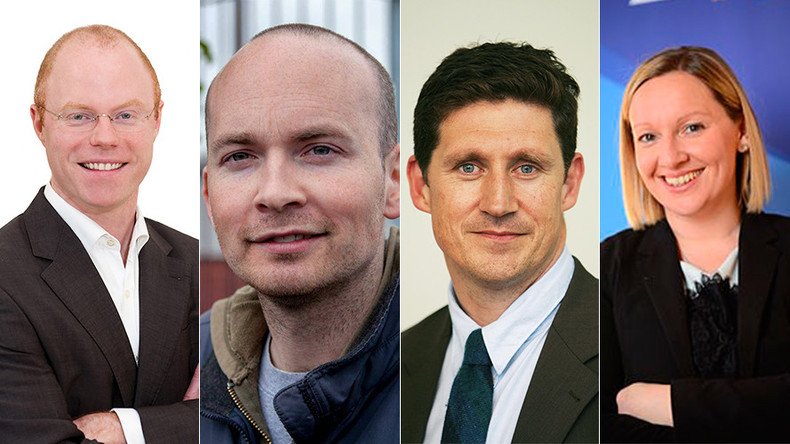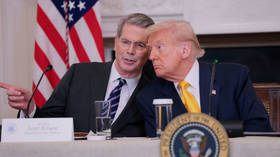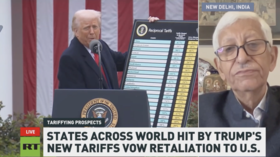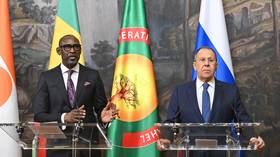Irish General Election 2016: RTÉ leaders’ debate line-up sparks allegations of censorship

The exclusion of four out of eight of Ireland's main political parties from Irish state broadcaster RTÉ’s second leaders’ debate amounts to censorship ahead of Friday's general election, an Irish TD (MP) has said.
Co-leader of the Social Democrats, Stephen Donnelly, made the remark as Ireland’s general election campaign race entered its final week. Speaking ahead of Tuesday's leaders' debate, the TD for Wicklow and Carlow East accused RTÉ of a pro-establishment bias.
“We’re trying to get a message out on a fraction of the resources available. When the State broadcaster is essentially engaged in censorship of four of the eight political parties three days ahead of the debate it makes it very difficult,” he said.
“Personally, I think the Irish people would prefer as full and frank a debate as possible, as opposed to a debate of the establishment from the establishment.”
Hard to challenge cartel when new parties excluded from 3 of 4 televised debates. The revolution clearly won't be televised. #leadersdebate
— Stephen Donnelly (@DonnellyStephen) February 23, 2016
RTÉ’s first leaders’ debate, broadcast on February 15, featured representatives from 7 political parties: Fianna Fáil, Fine Gael, Sinn Féin, Labour, the Anti-Austerity Alliance/ People Before Profit group, Renua Ireland and the Social Democrats. However, Tuesday’s panel was limited to the leaders of Fianna Fáil, Fine Gael, Sinn Féin, and Labour.
RTÉ’s failure to offer voters a more diverse line-up sparked outrage and led the excluded smaller parties to call for fairer representation. In a bid to challenge the broadcaster's selection process, the Social Democrats lodged a formal complaint with RTÉ's Director General Noel Curran on Monday.
“We have asked RTÉ to review its programming for the last days of the campaign with a view to addressing an imbalance,” a spokesman for the party said.
'Desperate and futile'
Speaking to RT, general election candidate for Limerick City Cian Prendiville said Ireland’s political landscape is changing.
“RTÉ seem to still be living in the old days when people simply voted for one of the big, establishment parties. But that has changed now and changed utterly. RTÉ need to get with the program,” he said.
“More and more people are sick of the parties of the political elite and are looking towards smaller parties like the Anti Austerity Alliance, and genuine left independents. That should have been reflected in tonight's debate.”
There really isn't any justification for excluding #SocDems on this debate. Sloppiness or arrogance perhaps. https://t.co/ecAguVptrt
— Gary Gannon (@1GaryGannon) February 21, 2016
Prendiville, who is an Anti-Austerity Alliance Councillor for Limerick City North, said the line-up of the final leaders’ debate will not affect the outcome of Friday’s general election.
“I think this attempt to shut us out is desperate and futile. People have been politicized by the water charges movement, and don't simply rely on the media any more. They get their information from friends, family, neighbours and social media,” he said.
“There is a political revolution underway, and there is nothing the political elite or the media establishment can do to stop it.”
girl at an anti-austerity demonstration #GE16#Ge2016#socdems#AAA#Right2Change#right2water#PeopleBeforeProfitpic.twitter.com/OQpww55dbW
— Brenda Malloy (@dubliner24) February 23, 2016
Prendiville and Donnelly's criticism of RTÉ's general election coverage follows a legal challenge from Ireland's Green Party over its exclusion from both leaders’ debates.
The action was launched earlier this month after Ireland’s Broadcasting Complaints Commission (BCC) said it could not consider the Green Party's concerns regarding RTÉ censorship. The media watchdog told Green Party leader Eamon Ryan at the time its remit only extended to complaints relating to programs that had already been aired.
Throughout the course of the ensuing hearing, Ireland’s High Court was told that RTÉ’s omission of Ryan from the debate panels was unjust and unconstitutional. However, the Green Party lost the legal challenge, with High Court Judge Ms. Justice Marie Baker rejecting allegations that the broadcaster's selection criteria were unfair or disproportionate.
Hung parliament?
Friday's general election is the first Ireland has seen since the state was forced to surrender its economic sovereignty in 2011. The 2011 vote, which occurred several weeks after the Troika’s (IMF-EU-EC) arrival, was anything but an ordinary ballot.
Center-right party Fianna Fáil, which had dominated Irish politics for decades, imploded as a center-right coalition of Fine Gael and the Labour Party clinched power.
Over the course of the following four years, Ireland was gripped by grueling austerity.
The state was forced to pay 42 percent of the Eurozone’s bank bailout costs and experienced levels of emigration not seen since the 1850s. In the face of Troika diktats and punitive government cuts to welfare spending, rural and urban communities across Ireland were crippled by homelessness, crumbling health services and soaring joblessness.
Latest Red C poll says half of Irish people feel "no effect" from the recovery. That's a lot of whingers, @EndaKennyTD. #ge16
— Ronan Burtenshaw (@ronanburtenshaw) February 21, 2016
An opinion poll published on Tuesday revealed close to 50 percent of Irish voters surveyed feel no effects of Ireland's so-called economic recovery.
When undecided voters were excluded, the Red C/Paddy Power poll estimated right-wing parties Fine Gael and Fianna Fáil would secure 30 percent and 20 percent of the Irish electorate's vote respectively.
Centrist parties Labour and Sinn Féin were on 15 percent; independent candidates were on 14 percent; the left wing Anti-Austerity Alliance/People Before Profit group was on 3 percent; the center-left Social Democrats were on 4 percent; and the left-leaning Green Party was on 3 percent. The poll also predicted that right wing party Renua Ireland and the Independent Alliance would secure a total of 4 percent of the vote.
Statement from young Unite members in Dublin on #GE16#GE2016 and the so-called 'recovery' https://t.co/5UI4M4ZZ1ipic.twitter.com/CXoHuDG1Of
— Unite Youth Dublin (@UniteYouthDub) February 25, 2016
In recent weeks, RTÉ’s general election coverage has been marred by allegations of bias. More broadly, the state broadcaster has been accused of slanted reporting on Ireland's controversial abortion ban and anti-austerity protests.
Tuesday's leaders' debate featured Irish Taoiseach (prime minister) and leader of Fine Gael Enda Kenny, Labour Party leader Joan Burton, Fianna Fáil leader Michéal Martin, and head of Sinn Féin Gerry Adams. It was moderated by RTÉ journalist Miriam O'Callaghan and lasted for 90 minutes.
Issues discussed included Ireland's homelessness, mortgage arrears and health crises, the state's culture of cronyism, and the need for an economic recovery characterized by social equity.
Polling stations will open across Ireland early on Friday morning.













